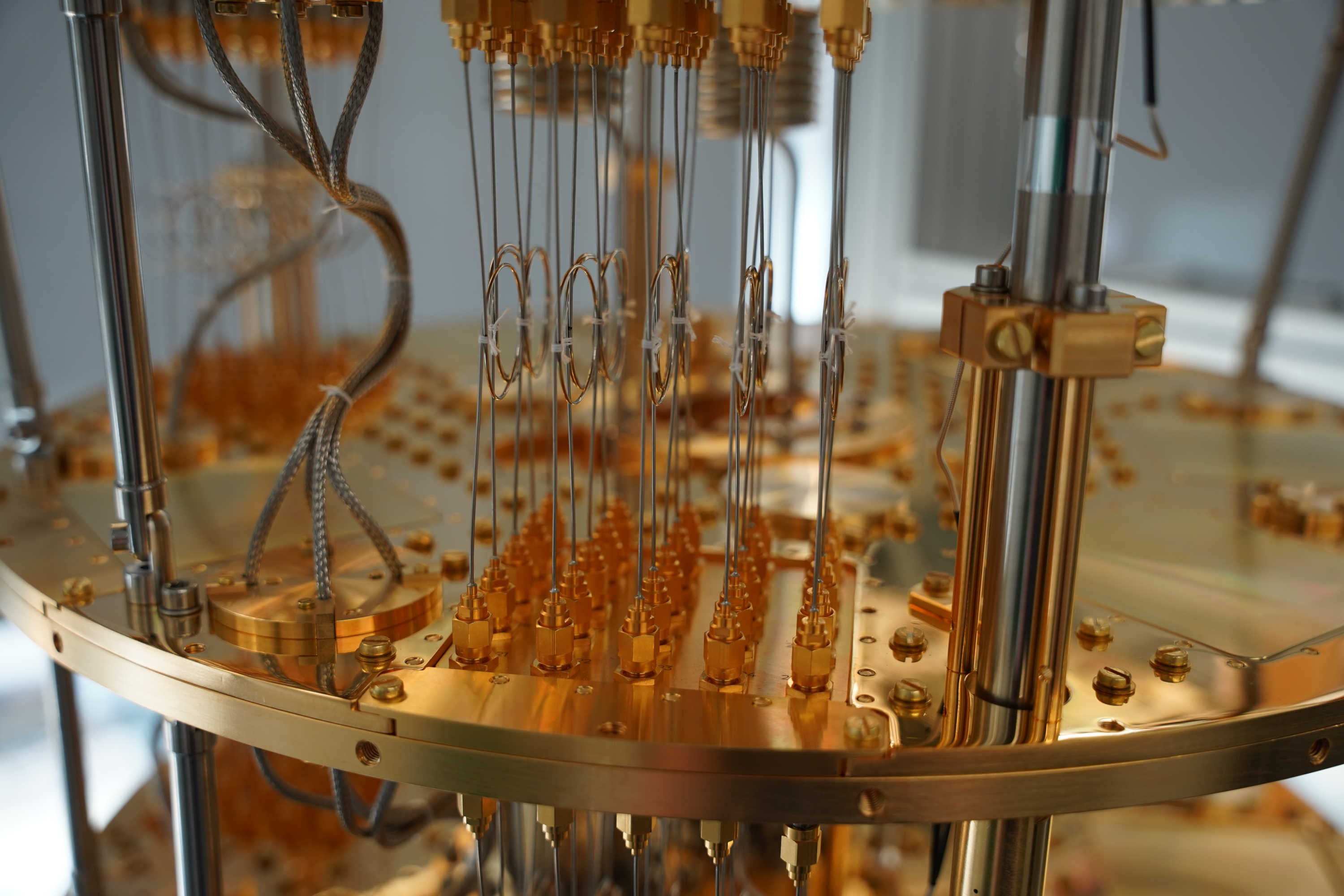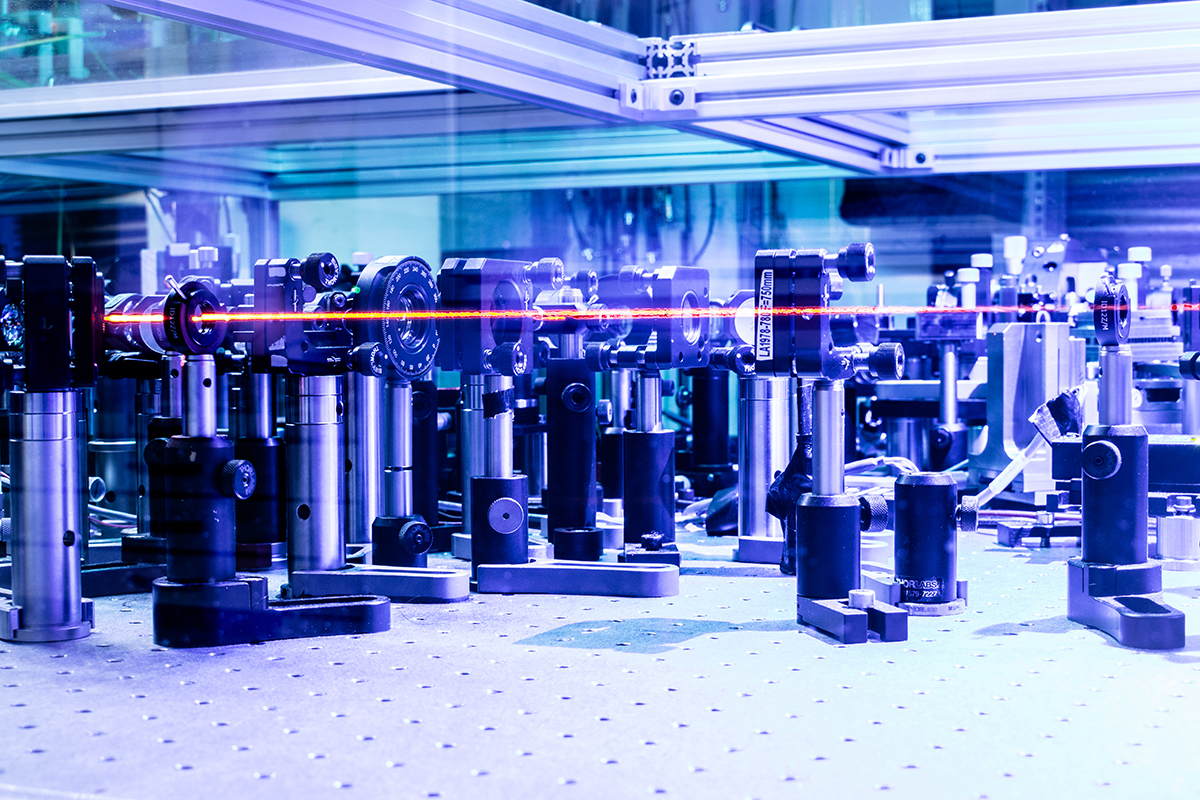Introduction to Quantum Computing
K. Staudacher, X-T. M. To, F. Krötz, D. Linder
This course will be held in English!
Welcome to the website for the Introduction to Quantum Computing
in summer term 2024. On this page you will find all information about the lecture
and the corresponding tutorials.

Source: Bluefors Quantum Computer
at the Leibniz Supercomputing Center

Source: University of Vienna
News
25.04.2024
The registration for the Moodle course (and therefore the lecture) will be closed on April 26th after the lecture (5pm).15.04.2024
Please note: The first lecture (on April 19th) is taking place in Schellingstr. 3, S002.All other lectures are taking place in Oettingenstr. 67, B001!
22.03.2024
The lecture will be organized exclusively via Moodle. Please register for the course with the access key FreitaQ:BitsNQubitsAdventuresYou do NOT have to register in LSF or in uni2work.
26.02.2024
The lecture will take place exclusively in presence. Lecture recordings (in German) of the last terms can be found in LMUCast (link to playlist is in the Moodle course).Content of the Lecture
Two scientific revolutions shaped the first half of the 20th century. On the one hand, pioneers such as Konrad Zuse, Alan Turing, and John von Neumann laid the foundations for the construction of the first practical calculating machines. On the other hand, the classical world view of physics, which had been expanded but hardly changed since the days of Newton, collapsed with the description of quantum mechanics.
These scientific revolutions were quickly followed by technical ones. Everyone is aware of the extent to which computers have shaped our society, our view of the world and our view of humanity. Many people are less aware that quantum mechanics also influences our everyday lives. It was the quantum mechanical description of the atom that made it possible to develop semiconductors and lasers; the transistor radio, the CD player and modern computer hardware are all consequences of quantum mechanics.
In recent decades, these two sciences have been brought together and a new interdisciplinary branch called quantum computing has emerged. The aim is to build quantum computers, develop quantum algorithms and investigate the consequences of quantum mechanics for information transmission.
The lecture explains the basics of quantum computing, including:
- Introduction to quantum mechanics
- Mathematical foundations (mainly linear algebra)
- Complexity of quantum algorithms and the need for new complexity classes
- Quantum bits (qubits) and quantum registers
- Quantum teleportation, dense coding and entanglement
- Various quantum algorithms, including search algorithms and quantum Fourier transformations
- Shor's algorithm and the implications for modern cryptography
- Hybrid quantum algorithms
- Quantum communication and quantum cryptography
- Available hardware and quantum computers
Prior Knowledge
To participate, you should be familiar with the following content:
- Linear algebra
- Cryptography (e.g. from the IT security lecture): symmetric and asymmetric encryption methods (e.g. RSA), key exchange (e.g. Diffie-Hellmann)
- Basic understanding of quantum physics is helpful, but not a prerequisite
Participation
- Audience:The lecture is aimed at students in the Master's degree program in Computer Science, Media Informatics, Bioinformatics, students in the main study program in Computer Science (Diploma) or Media Informatics (Diploma) as well as students with a minor in Computer Science. Bachelor's students of Computer Science or Media Informatics can specify the lecture as "Vertiefende Themen der Informatik für Bachelor".
- SWS/ECTS: 5 SWS (3V, 2Ü), 6 ECTS according to module description
- Major course assessment: Written exam
- Exercise mode: In addition to the lecture, weekly exercise sheets with tutorials are offered, with the submission of exercise sheets a bonus can be earned for the exam.
- Thursday, 12pm-2pm
Oettingenstr. 67 - B U101 - Friday, 10am-12pm
Oettingenstr. 67 - B U101
The tutorials will start in the week of April 22, 2024.
Dates
Lecture
Friday, 2pm-5pm
Oettingenstr. 67 - B 001
| Date | Topic | Speaker |
|---|---|---|
| April 19th | History and Overview | Korbinian Staudacher |
| April 26th | 1- and 2-Qubit Systems | Florian Krötz |
| May 03rd | 1- and 2-Qubit Systems/ Entanglement |
Florian Krötz |
| May 10th | Entanglement/ Measurements |
Florian Krötz |
| May 17th | Complexity and Interference Quantum Algorithms |
Korbinian Staudacher |
| May 24th | Grover's Algorithm Grover's Algorithm: Max-Cut |
Michelle To |
| May 31st | -- |
-- |
| June 07th | Variational Quantum Algorithms | Justyna Zawalska () |
| June 14th | Quantum Fourier Transform | Michelle To |
| June 21st | Shor's Algorithm | Michelle To |
| June 28th | Quantum Key Distribution | Florian Krötz |
| July 05th | Error Correction | Korbinian Staudacher |
| July 12th | Photonic Quantum Computing |
Dr. Tobias Guggemos (University of Vienna) |
| July 19th | Q&A Session | |
| July 29th |
Exam |
Tutorials
You can choose one of the following tutorial time slots:
Exam
Information will follow.
Lecture Notes
The lecture notes and the slides for the lecture can be found in Moodle.
Recommended Literature
KAYE, Phillip; LAFLAMME, Raymond; MOSCA, Michele.
An introduction to quantum computing
Oxford University Press, 2007
HOMEISTER, Matthias. (German)
Quantum Computing Verstehen: Grundlagen – Anwendungen – Perspektiven.
5th edition, Springer-Verlag, 2018
Quantum Computation Lecture Notes and Homework Assignments
Cornell, Spring 2006
http://www.lassp.cornell.edu/mermin/qcomp/CS483.html
David McMahon
Quantum Computing Explained
John Wiley & Sons, June 2008
EAN: 9780470181362
Aaronson, Scott
Introduction to Quantum Information Science Lecture Notes
https://www.scottaaronson.com/qclec.pdf
Michael A. Nielsen, Isaac L. Chuang
Quantum Computation and Quantum Information
https://doi.org/10.1017/CBO9780511976667
10th Anniversary Edition, Cambridge University Press, 2012